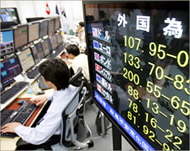Falling dollar bad for Eurozone
As oil prices fall to seven week lows, another economic problem is now the focus of analysts and the media: The falling dollar.

Commentators are convinced that the dollar could slip past its recent record lows against the Euro. With 1 euro buying $1.29, analysts have predicted that, even after a post-election rally, the dollar could slip to $1.35 to the euro or even less.
However, there are signs that rather than damage the American economy, as is predicted, it could be other currencies who feel the heat.
The Eurozone is especially vulnerable. This week it announced overall third quarter growth at just 0.3% – the slowest for a year.
Poor results
Germany, France and Italy all announced extremely disappointing third quarter economic results.
|
“The Euro needs lower interest rates to get the currency down. The Eurozone needs to strike out on a different policy” Roger Nightingale, |
France’s recent surge in demand slumped to near zero, recording just 0.1% of growth. Germany, traditionally the European powerhouse economy and manufacturing base also recorded just a 0.1% growth figure.
High oil prices did affect the German economy, as others, but what has hurt most is a big drop-off in exports.
Germany still has a large manufacturing base, and the relative strength of the euro means its exports are effectively more expensive.
At the same time, demand within the Eurozone has also failed to stimulate German industry.
As Joachim Fels and Annemarieke Christian of Morgan Stanley pointed out, “while German domestic demand has grown at a meagre rate of 0.3% since the start of EMU in 1999, real exports of goods and services have increased by 49% over the same time span, taking the share of exports in GDP up from 29% in late 1998 to no less than 40% in 2Q 2004”.
“Net exports now amount to 6% of GDP. The German economy depends more heavily on foreign trade (both exports and imports) than it ever has in its history,” they said.
Weak dollar benefits
So, a strong Euro is limiting exports. This does not just put the Euro in competition with the falling dollar but also, in a competitive devaluation climate, it is in competition with other similar currencies, notably the yen.
 |
|
A strong euro is limiting exports of |
Roger Nightingale of Saracin Chiswell in London explained to Aljazeera: “The Euro needs lower interest rates to get the currency down. The Eurozone needs to strike out on a different policy. They could do it, at their last meeting I thought [European Central Bank chairman Claude] Trichet might do it. But he didn’t.”
So instead of the Euro being in a tussle with a falling dollar, the Euro is pitched against a more buoyant Japanese currency.
Germany 0 Japan 1
“There are two big competitors here. Germany and Japan. Basically there are not enough people buying the things they both make to satisfy the both of them. They both need to take business off each other.
“Japan was helped by selling capital goods, machinery and so on, to China in the past few years. China expanded rapidly and the relative low price of the yen benefited Japan,” he said.
Rather than high oil prices hurting dollar finance, Nightingale asserted that it was the other currencies that would feel the brunt.
 |
|
The relatively low price of the yen |
“All the money that is being made by the [oil] producer countries, where does it go? Most of it is recycled back into dollars in the form of US government bonds and treasuries. This props up the US. Oil consuming countries will be, are [already] being hurt by a rise in oil price. But as a consumer country the US has protection as 90 to 95% of that money goes back into the US economy,” he told Aljazeera.net.
Maybe this is what Dick Cheney meant when he said “what is wrong with high oil prices?”
“As well the US are not producing the same things as the Germans and Japanese,” continued Nightingale. “With Germany being the industrial base of the Eurozone they have to compete globally with similar economies, the Japanese and also you could include Korea.”
Radical measures needed
The only way out for the Euro, said Nightingale, was to take some radical measures.
“If Europe does not get its economy into shape then one of two things will occur: Either we will have a revolution in Europe or Trichet will cut interest rates to zero as they did in 1996 in Japan.
|
“If Europe does not get its economy into shape then one of two things will occur: Either we will have a revolution in Europe or Trichet will cut interest rates to zero as they did in 1996 in Japan” Nightingale |
“At the last meeting I though he was going to burst into tears. This has to be a prelude for the Eurozone to get the economy moving in a different direction.”
Nightingale’s ideas may well have some traction.
As France and Germany announced stumbling economic data Lynn Reaser of Bank of America Capital Management predicted American job growth of “around 200,000 a month” for 2005.
Then the American General Aviation Manufacturers Association came out with figures saying that the purchase of corporate jets in the USA had surged in 2004.
If financial Europe has its eyes on some of the same flyaway profits and executive perks they may need to take some unpopular fiscal measures to help the euro.
Whether they will do that, or whether new twists in the current economic turmoil are ahead, remains to be seen.